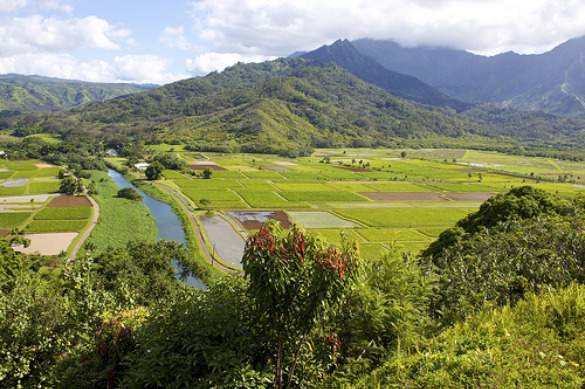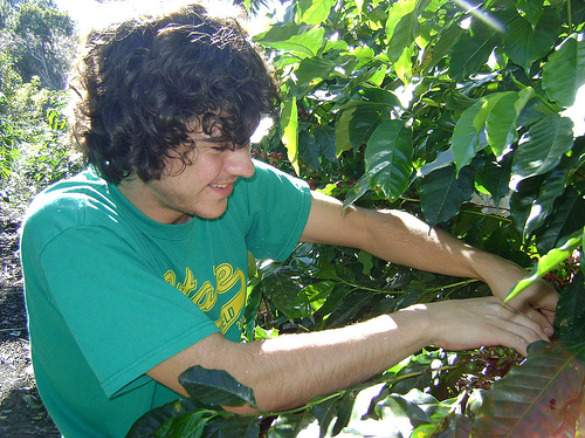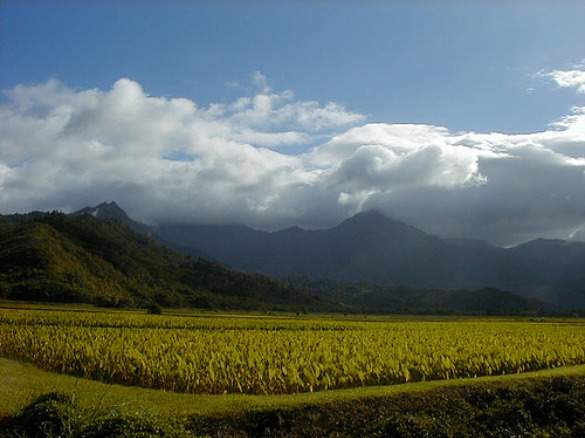What is WWOOF? The acronym stands for World-wide Opportunities on Organic Farms. It is a program designed to link up hosts (farms) that are seeking short term volunteer labor (wwoofers) in exchange for a housing situation and some food. WWOOFing in Hawaii is the same idea, but you get to do it in paradise!
Hawaii holds an allure for its warm weather year round and endless adventuring opportunities. From experiencing the world’s most active volcano on the Big Island, to shooting the curl on the North shore of Oahu, a helicopter ride across the beautiful Waimea Canyon of Kauai, a rainforest drive on Maui, or a remote escape to Molokai, the wonders of the Hawaiian island chain are many.
However, if you look at the costs associated with a vacation, the flight to Hawaii is relatively reasonable, but lodging can be exorbitant. After just a one week trip, the hotel stay alone could cost you well over $700 and you haven’t even eaten anything yet. Perhaps, a work exchange program like WWOOF should be explored. If you are interested in organic farming and are planning to stay at least two weeks this could be your ticket.
[social]
Where to find opportunities
The founding organization is WWOOF-USA. You can scroll through the listing of over 50 potential farms located all throughout the islands. The cost to join is $20 annually, but if you have a desire to do any more volunteering in the United States, it is well worth it. If you are only interested in Hawaii, the most farm listings can be found at www.wwoofhawaii.org, with over 190 host listings. The cost is also $20 annually and once you pay your dues you have access to the full listings and profiles of the hosts. Many of the opportunities are on the Big Island, but all the other islands have positions available as well.
A brief overview of the Islands

• The Big Island – The largest island of the Hawaiian chain. It has varied topography with 11 of the world’s 14 different ecological zones. It homes the tallest mountain in the world (from sea floor 33,000 ft.), Mauna Kea and the most active volcano the Kilauea Caldera. Beaches by color: Gold, white, black and even green!
• Oahu – Home of the capital Honolulu and arguably the best nightlife of all the islands. If you are looking for scenic beauty, but still modern civilization,this island’s got it. Famous Waikiki Beach is here and the island is known for being one of the best surfing islands along with Maui.
• Kauai – Known as the garden isle due to its sheer natural beauty. The most eco-friendly island of them all. One road travels about the island and it doesn’t even make it all the way around…
• Maui – A smaller island but known as a good place to play. The beaches are long and scenic, the surfing is killer, and there are great restaurants and bars. The rainforest drive to Hana is a 3 hour one way, narrow, slice of heaven and of course the Haleakala volcano is always watching over you.
• Molokai – The least inhabited of all the islands, with a little over 7,500 residents. It is a remote treasure that is relatively unexplored by tourists and is a great option for those who want an escape.
When should I plan my trip?
You can work on a farm in Hawaii all year round as farms on the islands grow year round depending on the crop. Winter (November-April) is the most popular for wwoofers who are trying to get away from the cold. Summer is more popular with families with school children and tourists south of the equator. Pick your time, pick your season.
>> Read more about when to go to Hawaii
Work commitment
The WWOOF listings should provide a comprehensive overview of what your work commitment will be and what you will receive in exchange. (Caution…if it sounds vague in description, it will most likely be when you arrive, and you will wish you didn’t!) Focus your search to those listings that take the time to give you a picture of what your farm life will be like. The more thorough a write-up listing is, the more accurate it will be.
Most hosts require a work exchange of 25-30 hours per week with two days off and a time commitment of at least two weeks (some up to three months and longer). This exchange should provide you with a housing situation (private or shared room, yurt, or covered tent pad), plus three meals a day.
You should expect to be responsible for some of the cooking; however with this amount of work all food should be provided. Each situation is different (vegan, vegetarian, etc…) so look at the listing closely if you have specific dietary requirements. Now, there are some hosts that require substantially less labor per day, just know you will also receive substantially less exchange. Depending on your monetary situation there are options for every budget.
What kind of work is available?

Weeding is the main job most workers will do. It’s often sunny in Hawaii and in some places rains a lot, so weeding is a necessary chore. It’s not all weeding, but every farm nearly all farms will have some weeds to pull. If you despise weeding you may need to reconsider this mode of travel.
Each listing will give an overview and will be different depending on the farm operation. But farm tasks would include: harvesting, especially fruit (from fruit trees), planting of vegetable plants, perennials and trees, caring for livestock (chickens, goats), digging irrigation, working in greenhouses, composting and light maintenance of grounds and buildings.
Keep in mind as well that these are working farms so the owners have a conceptual idea what the “big picture” looks like. Even though all you may do for a full day is dig a hole that could be the future water catchment pond to provide free gravity flow irrigation to the crops!
How do I get a position?
Once you have figured out which island you want to work on, signed up for WWOOF and found a few farms that appeal to your situation, how do you land the position?
One last suggestion before contact would be to research the farm not only thru WWOOF, but also to google the farm name and owners and see what other information is out there about them. After you know a bit about whom they are, and are still comfortable with them, send out a personalized email to them. Address them personally and mention some knowledge of the farm that you have found thru your research.
Here are the points to include in your email:
- A short, concise biography highlighting job experiences (farming and gardening skills a plus, but not necessary). Also include a couple of your pertinent personal interests
- A brief statement on why you are coming to the islands
- Your exact date of arrival and intended length of stay
- All your contact information, including phone number, email and mailing address
- A big “Thank You”
Then wait… farmers are exceptionally busy, but are always looking for help when they are in need of help, so be patient. If you have not heard back from a farm in three days, resend your email. If you do not hear back in a week, chances are the farm is not interested. There is no reason to wait longer than a week for a response, unless the farm asks you to.
When you do get a positive response via email, it’s going to be time for the interview, however; be prepared for the farmer to call you without sending a confirmation email. Again, if they need the help when you are available, they need the help!
The phone interview

Do not accept a position without speaking to the farmer or whoever is in charge of the farm operation. Every farmer I know wants to hear your voice, but if they don’t there could be a big problem waiting to happen.
Treat this like a face to face job interview. Since, most likely, you will not be meeting the farmer in person this is your chance to “win them over.” The farmer is trying to get a gauge of you.
What is your personality like? Can you hold a conversation well? Do you have a sense of humor? Since they will be living with someone they do not know, they are trying to find compatibility. Plus, you are probably not the only person applying for this position, so here are some tips to be successful:
- Be courteous and respectful
- Reiterate your qualities you stated in your email
- Take the time to answer their questions and understand their concerns
Here are some things you should be asking the farmer:
- Confirm the work requirement, days off and duties described in the WWOOF listing
- Confirm what food is available and who is responsible for preparing it
- Ask what the housing situation will be
- Ask what weather you can expect
- Inquire what clothing is appropriate while working?(i.e. tank tops, bathing suits, sandals)
- Find out where exactly the farm is located
- Ask what transportation is available – bikes, or public transportation in the area
- Find out if pick-up is available from airport or nearby town
- Any and all other concerns you feel about the farm
This is your chance to be thorough in your questions, so think carefully about what else you need to know. Ask questions pertinent to your lifestyle. Is there wireless internet? Is there phone access? Can a friend visit me? The more information you get, the more rewarding the experience will be by finding the right fit.
Chances are pretty good that if the interview goes well, the farmer will offer you the position immediately. Be prepared to accept or decline depending on how you felt about the communication. A day or two to think it over is appropriate on your part. The farmer may also need time to think it over. But a final verdict should come from the farmer within one week’s time.
Follow-up communication
You are almost off… Once you have been accepted for the position, periodically keep in contact with the host. Every few weeks send out an email, stating how excited you are or asking a question specific to the place you are staying. For sure send out an email or call a few days to a week before arriving. If for whatever reason the trip falls through and you have to cancel, let the farmer know immediately. It’s okay and they won’t be upset; most likely they have a backlog of people that want your spot.
Enjoy!
Once at your host farm, enjoy yourself! Remember to be respectful to the host’s views and lifestyle and your experience will be that much better. Revel in the fact that you made it to Hawaii in an alternative way. Experience all that the farm you are staying with and the land has to offer. Enjoy your work time and play as hard as you want in your off time, you deserve it.
The WWOOF program is a fantastic way to explore Hawaii, as well as the rest of the world. What seemed like maybe an unaffordable dream to explore a corner of the Earth you have always wanted to see, WWOOF has made possible. Good luck and happy farming!
Ready to go? Book your flight to Hawaii or learn more about visiting:
Photos by: bbum, John Donaghy, RodneyRamsey